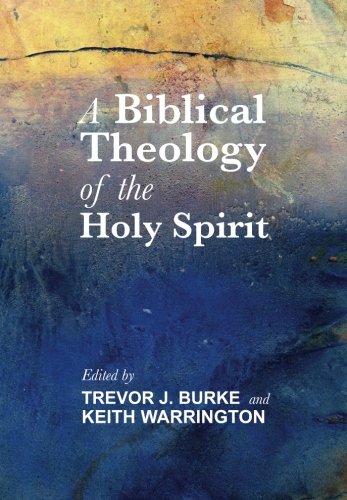Reviewed by Andreas Köstenberger
In my work on a forthcoming monograph on the Holy Spirit, few volumes have proved as helpful as Trevor Burke’s and Keith Warrington’s edited volume Biblical Theology of the Holy Spirit. The volume is well conceived in that the chapters helpfully break up the material into discrete sets of writings such as “The Pentateuch,” “The Historical Books,” “The Wisdom Literature, and so on. Also, the contributors were carefully chosen, in many cases having written their dissertations on their chapter topic (Wonsuk Ma, Mathias Wenk) or in other cases having contributed significantly to scholarship on the topic for many years (James Dunn, Max Turner).
That said, there is the inevitable unevenness among the contributions in this volume, in part because of different methodologies employed. Some follow a narrative, discourse-oriented approach (e.g., Dunn on Galatians), while others take a more topical tack (e.g., Keith Warrington on the Synoptic Gospels). Yet others blend the two approaches in some fashion, comingling narrative and topical aspects. There are also occasional differences in the criteria chosen for inclusion of certain passages as relevant for a biblical theology of the Holy Spirit.
What is more, most chapters focus almost exclusively on their respective corpus, which is appropriate but results in a lack of interconnectedness between the various chapters. This is especially unfortunate as it is the very purpose and nature of biblical theology to connect the dots among the biblical writings to trace thematic continuity or discontinuity and trajectories of development, both among different writers and within one and the same writer (e.g., Paul). An exception here is Craig Bartholomew, who in his chapter on the wisdom literature moves to the opposite side of the spectrum, spending surprisingly little time on the actual wisdom books while grounding them extensively in creation, in keeping with his conviction that creation theology is foundational to the theology of the entire canon.
Rather than reviewing each of the individual chapters one at a time, I will mention several insights regarding the scriptural teaching on the Holy Spirit that emerged from a close reading of the individual essays, both in their own right and in relation to one another. I will elaborate on these insights in my forthcoming monograph. The chapter on the wisdom literature certainly does a good job grounding the characterization of the Holy Spirit in the wisdom books in biblical creation theology. This connection is especially helpful as the wisdom literature is often the stepchild of Old Testament theology. Conversely, the chapter on Isaiah in my view suffers from an undue preoccupation with isolating distinct Spirit traditions in Isaiah (creation Spirit, wisdom Spirit); it would have been better to trace relevant references to God’s Spirit throughout the book, at least initially, before trying to connect the dots, both literarily and theologically.
A fascinating study of comparison and contrast emerged from the treatments of the Spirit in Jeremiah and Ezekiel, respectively. While both prophets ministered in the exilic period, and share several important parallel passages, their theology of the Spirit differs markedly. Ezekiel refers to the Spirit overtly as the life-giving and restoring agent of God for a renewed Israel and people of God. Jeremiah, on the other hand, features God’s ruach primarily as an emblem of divine judgment. Thus, it appears, Ezekiel takes a more optimistic approach while Jeremiah’s mood is more pessimistic.
The chapter on the Synoptic Gospels was perhaps the most disappointing in the volume as differences among the Gospels were obscured by the topical approach taken by the author. By contrast, the chapter on the book of Acts is very well done, even though it should be acknowledged that references to the Spirit in Acts are plentiful and it is easier to trace these references in a single book than treating three books jointly. What surprised me is that Acts contains a much more concentrated Spirit theology than Luke’s Gospel does, and in particular that there is a considerable paucity of references to the Spirit in the second half of the Gospel.
The chapters on Paul are generally well done, though, as mentioned above, it would have been helpful for someone to connect the dots among the different writings in the Pauline corpus. Max Turner’s chapter seemed to be more preoccupied with dealing with various scholarly debates regarding the Spirit than with a first-hand exploration of the biblical material itself. Nevertheless, I found it intriguing how the Spirit is presented in Ephesians almost exclusively as the divine agent of unity in the church. I also found it surprising how much the author of the chapter on Hebrews found to say about the book’s theology of the Spirit.
Overall, this is a well-conceived and stimulating collection of essays on the biblical theology of the Holy Spirit that makes an important contribution to the study of the scriptural teaching on the Spirit in both Testaments. The editors and the contributors are to be commended for their commitment to a biblical-theological approach which allows the teaching on the Spirit in Scripture to emerge organically from the biblical writings themselves and surfaces the various terminologies used for the Spirit as well as the various functions ascribed to him. Anyone seeking to do research or personal study on the Holy Spirit will do well to consult this volume.
Andreas J. Köstenberger is founder of Biblical Foundations™ and senior research professor of New Testament and Biblical Theology at Southeastern Baptist Theological Seminary. He is also the editor of the Journal of the Evangelical Theological Society and editor or co-editor of several series in Biblical Theology, such as the Biblical Theology of the New Testament series and the Biblical Theology for Christian Proclamation series. He is also Review Editor for New Testament here at Books At a Glance.
Buy the books

A Biblical Theology of the Holy Spirit